Finding Joy in Resiliency: The WRAP Program
Mia* would one day like to start a YouTube channel focusing on makeup. “I started doing makeup at like 7?” she recounts. “Like really young. My mom got me into doing it, I’d watch her do it. And then I started looking for more extreme looks on my own.” This is what inspired her to create “Cyan Blue”, a styrofoam mannequin head painted with acrylic and decorated with pearlescent gems, lashes, and a yarn mohawk. Through YouTube, she perfected her craft over the years.
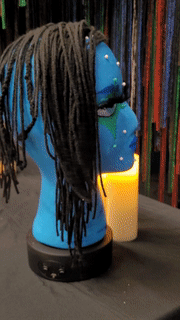
“I would explain it as a token of my creative freedom, and my ability to try new things. Because before this I’d never done anything like it. I’ve mostly done 2D portraits, but to have to [apply that] to an actual head was really different for me.” – Mia
This styrofoam head, as well as many others, were on display at the capstone event for the Wellness Resiliency Arts Program (WRAP) last Friday. For over 5 years, WRAP has addressed the traumatic effects of violence on teens by providing an arts-based therapeutic atmosphere that helps with reflection, decision-making, and tools to cope with their trauma.
Over the course of two weeks, trauma informed teaching artists Zahra Baker, Idris Daniel, Kimberly Mahal Laude, Amaniyea Payne, Veronica Bohanan, and avery r. young led 13 teens on five artistic tracks: dancing, drumming, creative writing, spoken word/poetry, and visual arts. On August 19th, their families gathered at The Reva And David Logan Center for the Arts to experience the program’s culminating event with a gallery exhibit and performances.
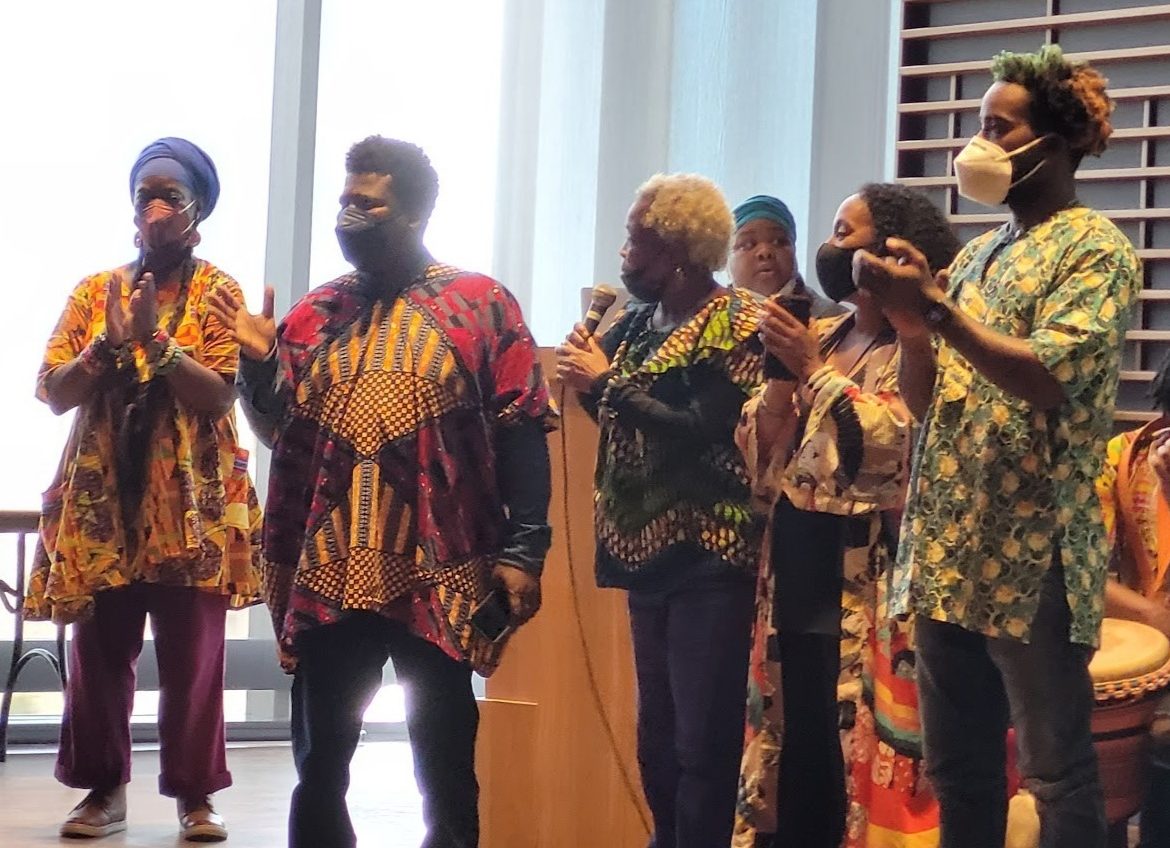 From left to right: Teaching Artists Zahra Baker, avery r. young, Amaniyea Payne, Victoria Bohanan, Kimberly Mahal Laude, and Idris Daniels.
From left to right: Teaching Artists Zahra Baker, avery r. young, Amaniyea Payne, Victoria Bohanan, Kimberly Mahal Laude, and Idris Daniels.
At the Logan Center, the All That Light: A Ten-Year Retrospective of the Artists-in-Residence (AIR) Program (2012 – 2022) exhibition is on display. “The youth visited the exhibit on the first day of the program.” Teaching Artist Zahra Baker explains. “After reflection, they each chose one piece to use as inspiration for their own discipline.”
At the final event for WRAP, upon entering the space, rhythmic drums (performed by the youth) greet the audience. As the percussion drums up the anticipation, the first thing seen walking in is a bright yellow ”All That Light” sign. Standing by each piece in the exhibit is a participant from the program, ready to describe the piece they chose.
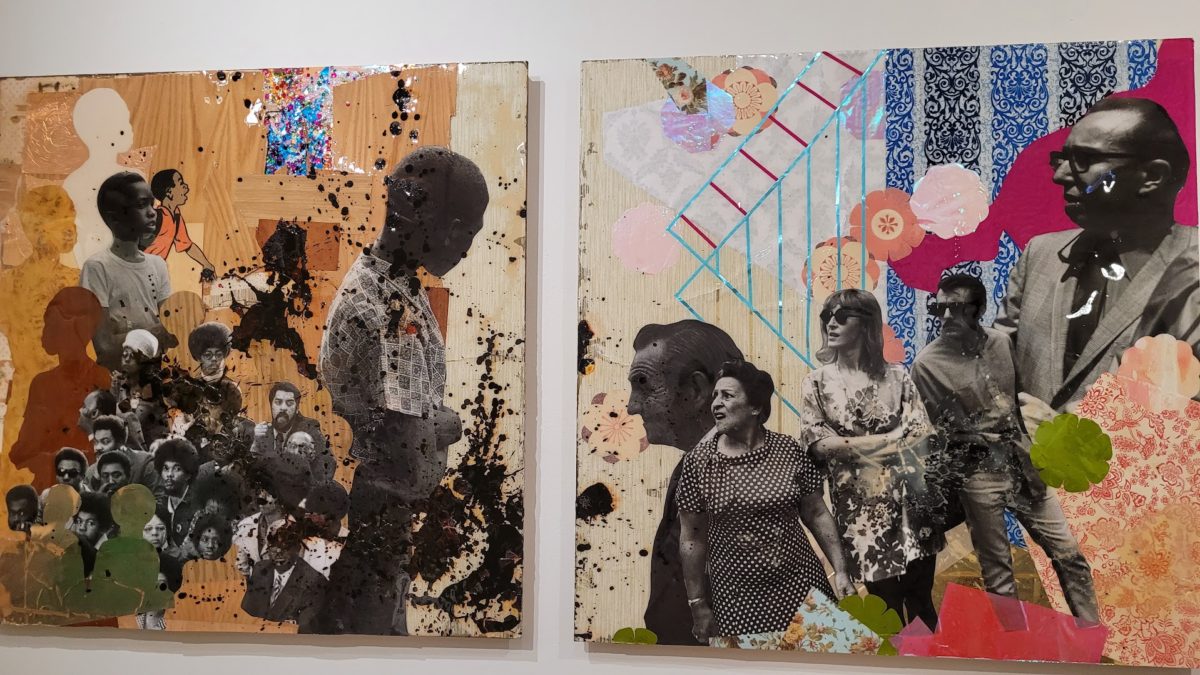 Above: “The Grove Line” by Delano Dunn.
Above: “The Grove Line” by Delano Dunn.
James* stands by “The Grove Line” by Delano Dunn (pictured above). James describes how this piece felt like it was depicting the racial divide in America. On the left, collage cutouts of black folk are surrounded with rich colors splattered in dark shoe polish. This chaotic splattering, James says, reminds him of bloodshed and chaos spilled as we fight for civil rights. He contrasts with the other side of the diptych, representing judgment and outcast, as cutouts of white people stand and stare at the other half of the piece against a floral background.
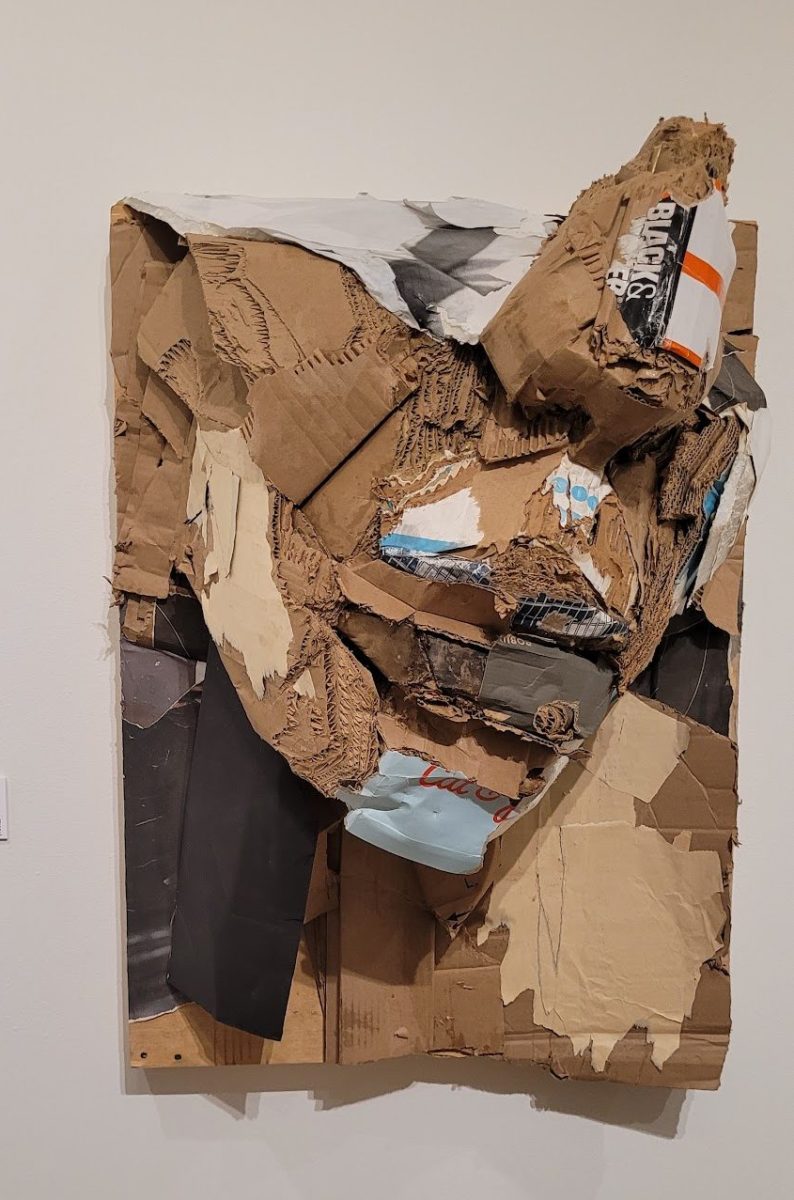 Above: “Reflective Gesture” by Stephen Flemister.
Above: “Reflective Gesture” by Stephen Flemister.
Omar* stands next to “Reflective Gesture” by Stephen Flemister (pictured above). Constructed out of cardboard, wood, and paper, what appears to be part of a man’s face spans tall on the wall. Omar describes the piece with a short story of a man named Cole, who almost drowns one day and loses his memory. Omar then stops and grins, saying “I can’t say anymore cause it’ll spoil the story. You’ll just have to wait and see when we get upstairs.”
The percussive drums are still going strong when Teaching Artist avery r. young’s powerful voice echoes through the gallery. He informs everyone that the show continues at “The Penthouse” upstairs
“Kim Mahal Laude and I worked as co-facilitators in the visual arts.” Zahra says. “[She] was interested in having them paint and embellish Styrofoam heads. I was interested in creating an installation that would highlight their work as well as assist them in articulating their ideas, processes, and inner thoughts. We chose the theme: What’s in your head?”
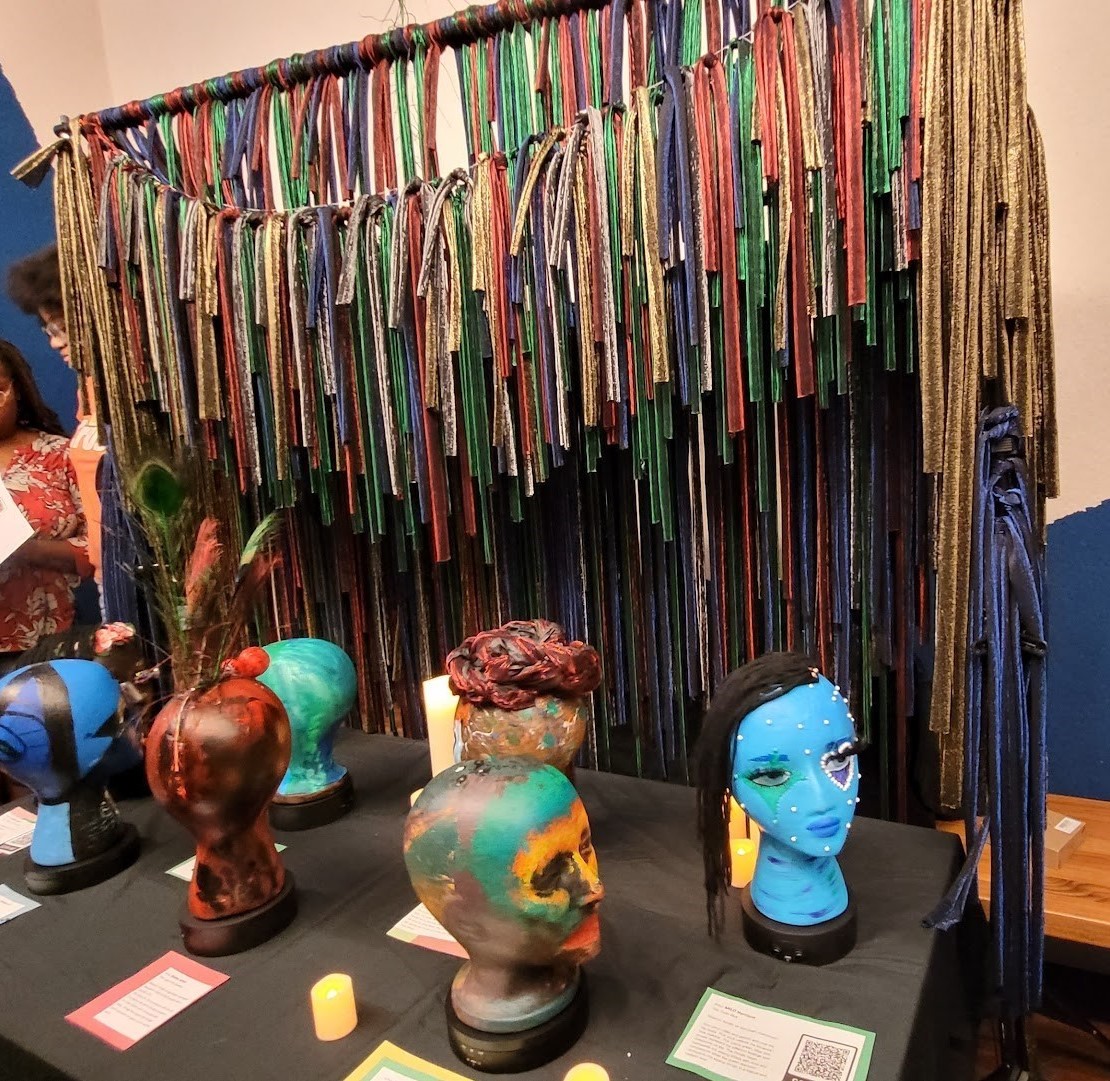 Above: Styrofoam head display at the WRAP culminating event. Each head sculpture also included QR code links to their own audio tracks of internal uplifting messages.
Above: Styrofoam head display at the WRAP culminating event. Each head sculpture also included QR code links to their own audio tracks of internal uplifting messages.
The styrofoam head display came to life (including budding makeup artist Mia’s work) sitting at the entrance of the penthouse (pictured above). During the first session of the program, the Teaching Artists discovered the youth liked to sing.
I wanted to find a way for them to create music that supported the theme, so I introduced the idea of using affirmations,” Zahra muses. “So, each youth wrote and recorded their own internal uplifting message which was recorded and placed on a QR code. Handouts of the QR codes and artist statements were distributed during the showcase.”
Once seated inside the penthouse, the second half of the performances began. An imagined story, inspired by Stephen Flemister’s piece, is read out-loud from five participants in the creative writing track (including Omar), led by Veronica Bohanan. The spoken word portion, led by avery r. young, is paired with the art that inspired their poems projected on the screen behind them. The official drumming portion is paired with African dance led by Teaching Artists Idris Daniel and Amaniyea Payne.
Applause, cheers, shouts, and a standing ovation rings out from everyone in the room.
Dr. Doriane Miller, one of the founders of the WRAP Program, says a few words to conclude the event. She speaks about this program providing youth, in combination with the Teaching Artists, Urban Gateways, UChicago, and other partners, the space to not only reflect on the situations they’ve experienced, but also that there is potential and beauty beyond that. Dr. Miller quotes a dear friend of hers: “Don’t complain about being in the rain, learn how to dance in it.”
About the Wellness Resiliency Arts Program (WRAP):
The current two week intensive multimedia arts WRAP program actually started as a one week spring break CPS program. “[We wanted to address the question:] How can they develop some resilience and to see that there is still joy in their lives?” Dr. Miller explains. “To know that there’s another way that they can be within community, and also [acknowledge] the fact that the arts can be very healing.”
The arts they engaged participants in started out with spoken word and poetry, later adding visual arts. Through continued funding of the program, they were able to expand and include African dance and drumming. Dr. Miller breaks it down the structure of the day.
“It’s a five hour program. They come in, they do a little bit of a gathering in the morning, and just a one word check in: “How are you feeling?” They go to support time with the social work interns, just to process how they’re doing. Then they go to an arts section, they have lunch, they go to another arts section. They go to social work support later for another half hour.“
WRAP included paid internship experiences for four UChicago School of Social Service Administration (SSA) social work students, a non-paid internship for students from the Pritzker School of Medicine’s Health Disparities Course, and a volunteer SSA faculty member/PhD student that served as a site supervisor.
Through these art mediums, teens learned skills such as active listening, the use of non-judgemental language, personal responsibility, conflict resolution techniques, and important communication and team-building skills. Most importantly, they gained the tools to begin healing from their personal traumas, and to use these tools in responding to future challenges.
The WRAP program is significant because it is empowering for the youth. I feel that it opens a space that cultivates a sense of belonging and has allowed [the young people] to explore their own feelings and ways of self-expression, as well as empathize with others. The small number of participants allows time and space for mentorship and gives opportunity for [young people] to feel heard and appreciated by adults.” –Zahra Baker
Special thanks to the supporters of this program:
Joan Montezemolo

*In order to protect the privacy of the participants involved in this program, youth names and identifying details have been changed.